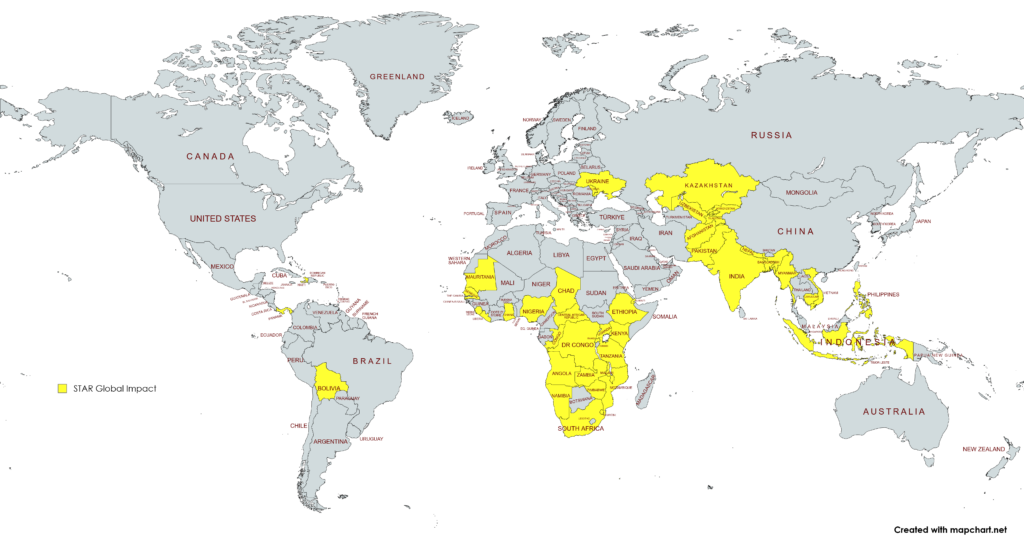STAR Strengthens Capacity of Global Health Professionals and Organizations, Improving Global Health Outcomes
Highlights

Through fellowships, internships, and strategic partnerships, PHI's STAR supported global health professionals and organizations and laid the groundwork for sustained impact in the global health sector.
300+ skilled global health professionals, recruited and supported by STAR
41 countries where STAR participants were placed
-
Focus Areas
Capacity Building & Leadership, Communicable Disease Prevention, Global Health -
Issues
Workforce Development
By integrating leadership training, fostering strategic partnerships, and addressing critical health challenges, PHI’s Sustaining Technical and Analytic Resources (STAR) supported the immediate needs of global health professionals and laid the groundwork for sustained impact in the field of global health.
Throughout the life of the project (2018-2024), STAR recruited and supported over 300 skilled global health professionals who were able to contribute technical leadership and expertise in many areas, and whose work made an impact in 41 countries.

STAR participants and partners collaborated in the development of systems and tools that strengthened and sustained local and global health responses and built capacity to better address diseases, epidemics, and pandemics in resource variable settings.
Some examples of global health impacts achieved by STAR participants include:
- developing emergency room protocols in Nepal
- providing technical assistance in multiple countries for appropriate COVID patient management
- supporting supply chain management for COVID vaccines
- improving infection control in health facilities in Afghanistan to prevent TB transmission among healthcare workers
- promoting community-based models to increase adherence to anti-retroviral treatment for people living with HIV in Nigeria and increase HIV testing in Zambia
- adapting to adverse conditions during the COVID pandemic to ensure the continuity of family planning services globally
STAR Fellow Spotlights

Abdulmalik Abubakar, MHE, MA, Strategic Information Advisor
Abdulmalik Abubakar worked as a Strategic Information Advisor within the Health, Population, and Nutrition Office of USAID in Lilongwe, Malawi. His role reflected his expertise and leadership, particularly in guiding the PEPFAR Program’s healthcare strategies and interventions. Mr. Abubakar’s interest in data analytics and healthcare began with a singular focus: to monitor and evaluate the effectiveness of healthcare programs. His adeptness with tools like Tableau, Excel, Quantum GIS, QGIS, and Python allowed him to perform intricate data analyses, driving informed, data-centric decisions. These decisions, in turn, empowered healthcare providers to deliver better services and interventions to the Malawian population. One of his standout achievements was the institutionalization of a routine data review process in Malawi, which revolutionized the way healthcare data is handled, enhancing its precision and reliability.

Dr. Emmanuel Matechi, MPH, MD, Senior TB & Global Fund Grant Advisor
Dr. Emmanuel Matechi contributed significantly to the development of Tanzania’s national health programs, particularly the National Tuberculosis and Leprosy Programme (NTLP). He leveraged his extensive background in public health and operational research to support various departments within the NTLP. Dr Matechi’s medical expertise and experience in operational research allowed him to effectively communicate with and understand the challenges faced by his colleagues and program participants. His ability to articulate data in accessible ways was invaluable in his advisory role. A cornerstone of his work has been an unwavering commitment to supporting Tanzanian program managers. He views their success as his primary goal and emphasizes the importance of prioritizing the Tanzania collective success of the team over individual achievements. His dedication highlights the importance of collaboration and a service-oriented mindset in achieving public health outcomes.

Dr. Nana Zarkua, Senior TB Technical Advisor
Dr. Nana Zarkua served as a Senior Tuberculosis Technical and Analytic Resources Advisor with the STAR program in Dushanbe, Tajikistan. Her journey has strategies been marked by a steadfast dedication to combating tuberculosis (TB) and achieving significant strides in TB control. Based within the National Tuberculosis Program (NTP), Dr. Zarkua collaborated closely with the National TB Program Manager and USAID experts. Her responsibilities included grant writing, program management, and providing technical support to scale up M/XDR-TB activities. Her contributions to developing the five-year Strategy Plan and updated guidelines underscore the importance of technical capacity building and local ownership in TB control efforts. Dr. Zarkua advocates understanding the local context, fostering collaboration, and building a strong network for effective TB control. Balancing her outsider perspective as a public health doctor from Georgia, she cultivates personal relationships within her team to foster trust and facilitate open communication.

Dr. Maria Idrissova, MD, MSC, Senior Drug-Resistant TB Advisor
Dr. Maria Idrissova’s professional journey in TB management has been marked by innovation and strategic diligence. She spearheaded the TB6 Program, integrating core and advanced indicators to achieve programmatic goals. Her approach balanced innovative solutions with foundational strategies, promoting rigorous target tracking and meticulous data quality monitoring. Dr. Idrissova pioneered cohort analysis in Tajikistan over two decades ago, and it is now a standard practice in Kyrgyzstan, advancing analytical practices within TB management. Collaboration and communication are central to Dr. Idrissova’s approach, facilitating continuous dialogue with stakeholders to adapt to new guidelines and ensure alignment. Her exceptional communication skills foster critical discussions, such as engagements with NCP management to discuss progress and policies. Lessons learned include the importance of robust TB strategies, effective collaboration, impeccable data quality, and tailoring projects to intrinsic goals for sustained success and innovation. Moving forward, Dr. Idrissova will focus on developing the TB6 Program and finalizing decisions on the new TB strategy, ensuring clear communication of partners’ roles and responsibilities.

Mohammad Golam Kibria, MPH, MBA, Senior TB Strategic Planning Technical Advisor
Mohammad Kibria, a seasoned expert in health information systems and monitoring and evaluation programs in Bangladesh, made significant contributions to the healthcare landscape through his extensive experience and involvement in the STAR Project. As a STAR Fellow, Mr. Kibria managed reports and activities, including preparing the National Tuberculosis Strategic Plan and Operation Plan. His role enhanced collaboration with partners and brought a systems perspective to complement clinical focuses in the TB Program. He emphasized the importance of aligning indicators to achieve Sustainable Development Goals and government plans. Strengthening the systems perspective and promoting capacity- building were key achievements, along with documenting use cases to analyze project outcomes Mr. Kibria continues to strengthen health information systems as he pursues his PhD in Health Informatics at the University of North Carolina where he is researching the integration of artificial intelligence and health informatics. He aims to gain more global experience before potentially starting his own company.
The lessons learned and recommendations outlined in their final report provide a blueprint for future initiatives aiming to build resilient global health systems. As STAR concludes, the legacy of its accomplishments will continue to resonate within the global health community. The insights gained from this program serve as a powerful reminder of the importance of investing in people and partnerships to drive meaningful and lasting change. Read the final STAR report.
Work With Us
You change the world. We do the rest. Explore fiscal sponsorship at PHI.
Support Us
Together, we can accelerate our response to public health’s most critical issues.
Find Employment
Begin your career at the Public Health Institute.
